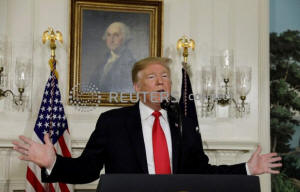|
House Democrats turbocharge committee
probes of Trump
 Send a link to a friend
Send a link to a friend
 [January 22, 2019]
By Ginger Gibson and Karen Freifeld [January 22, 2019]
By Ginger Gibson and Karen Freifeld
WASHINGTON (Reuters) - Democrats in the
U.S. House of Representatives have quietly tweaked a rule on taking
secret depositions that is likely to give a boost to their
investigations of President Donald Trump, his personal finances and his
administration.
The little-noticed change, made since the Democrats took over majority
control of the House earlier this month, will let staffers of House
investigative committees take testimony from subpoenaed witnesses
without a lawmaker being present.
By eliminating complications with lawmakers' schedules, the change will
let staffers work faster and range more widely, said former staffers and
sources inside the committees that are launching several inquiries into
Trump and his presidency.
The importance of this was underscored, legal experts said, when
attorney general nominee William Barr indicated last week that he was
unlikely to release the final report from Special Counsel Robert Mueller
to lawmakers in its original format.

Mueller has been probing for many months Russian meddling in the 2016
presidential election, any collusion between Moscow and Trump's
campaign, and obstruction of justice. If Barr is confirmed and holds
back on Mueller's report, the rule change may help House investigators
rapidly replicate Mueller's work.
"Dropping the member requirement will give much more power to staff
investigators in different committees, which will lead to increasingly
dispersed and now unsupervised authority for investigations," said
Kristina Moore, a managing director at FTI Consulting and a former
investigator for the House Oversight Committee when it was chaired by
Republican Darrell Issa.
"This change to the House rules represents a further expansion of the
majority's oversight and investigations targets, for which everyone in
the private sector needs to prepare," Moore said.
The government shutdown caused by a standoff between Trump and Democrats
over his proposed U.S.-Mexico border wall has been center-stage in
Washington for weeks, but Democrats have been moving ahead on plans to
probe Trump and his administration.
[to top of second column]
|

President Donald Trump delivers remarks on border security and the
partial shutdown of the U.S. government from the Diplomatic Room at
the White House in Washington, U.S., Jan. 19, 2019. REUTERS/Yuri
Gripas/File Photo

On Feb. 7, former Trump personal attorney Michael Cohen is scheduled
to testify to the House Oversight Committee, now chaired by Democrat
Elijah Cummings. On the next day, acting U.S. Attorney General
Matthew Whitaker is slated to testify to the House Judiciary
Committee.
CHANGE FROM REPUBLICAN RULE
When the Republicans controlled the House, up until early January, a
lawmaker from the committee that issued the subpoena had to be
present for a witness deposition. That sometimes presented
challenges, said current and former aides.
For example, when witnesses in New York were being interviewed by
the House Intelligence Committee over the past two years, lawmakers
had to travel with staff to conduct the questioning, one aide said.
Getting lawmakers to sit through long interviews of low-profile
witnesses, even ones with valuable information, could also be
difficult, the aide said.
The rule change was requested by the House Oversight Committee, said
several congressional aides said. But it will also affect the work
of other investigative panels, such as the Intelligence and
Judiciary committees.
Andy Wright, former associate counsel to President Barack Obama,
said the heads of the House investigative committees will be able to
subpoena all the witnesses who gave grand jury testimony for
Mueller.
"So now a subpoena for a deposition can be conducted by staff," he
said. "More depositions in shorter time and fewer steps between
request and contempt."
(Reporting by Ginger Gibson and Karen Freifeld; Additional reporting
by Mark Hosenball; Editing by Kevin Drawbaugh and Leslie Adler)
[© 2019 Thomson Reuters. All rights
reserved.]
Copyright 2019 Reuters. All rights reserved. This material may not be published,
broadcast, rewritten or redistributed.
Thompson Reuters is solely responsible for this content. |